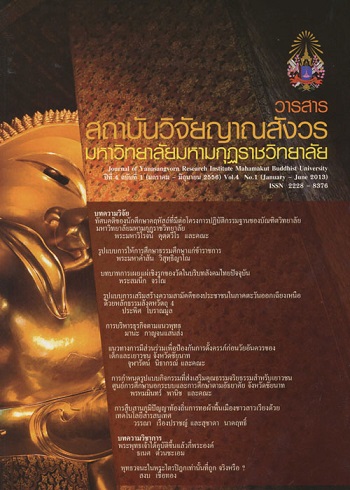Business Management According to Buddhist Approach
Main Article Content
Abstract
The objectives of this thesis were as follows: 1) to study the principles of business management, 2) to study the Buddhist principles appropriate to the business management, 3) to integrate business management with the appropriate Buddhist principles, and 4) to provide a guideline and to create new knowledge body on "integration of business management with an appropriate Buddhist principle." The data used in the study were collected from the Tipitaka, Commentaries, documents and research works including in-depth interviews with 8 academics and business experts. Having been analyzed and synthesized, the information was presented in the descriptive method. The results of the study showed that: 1. Business management is the process in planning, organizing, leading and controlling the organization resources in order to obtain the business target, i.e. to achieve profit, survival, and social responsibility. The business management was based on 4 main factors; Man, Money, Materials and Management to attain efficiency, effect, economy, cooperation and propagation. 2. The Buddhist principle appropriate to business management is 6 virtues for fraternal living; to be amiable in deed, to be amiable in word, to be amiable in thought, to share any gains with virtuous fellows, to keep without blemish the rules of conducts along with one’s fellows openly and in private, and to be endowed with right views along with one’s fellows. 3. Man or human management can be integrated with to be amiable in deed, to be amiable in word, to be amiable in thought, and to be endowed with right views along with one’s fellows. Money management is to keep without blemish the rules of conducts along with one’s fellows openly and in private, and to be endowed with right views along with one’s fellows, Material management to be integrated with to share any gains with virtuous fellows, and all the 6 principles are for Management process. It could be concluded that Buddhist business management can make man work happily, money management in the right direction, spending materials for the benefits of individuals and society, environmental conservation and create unity in the organization. The most important, the Buddhist business management is the right way to lead our society to love, unity, public-minded service, loving-kindness, sharing, rule of law and one vision. The results of the study can be set into a model with “LGRU-B Model”, L=Loving-Kindness, G=Generosity, R=Responsibility, R=Regulations, U=Understanding lead to Buddhist Business Management. Management concluded that based on Buddhist then. It will make the job a pleasure. Love is in the works. Colleagues. I make enough to understand and manage the money properly morality. The product is well worth the cost and the useful and helpful to others. Environment. Unity in the organization. Make life a complete pleasure. There is a pretty good physical and mental health. And that's important. Leading to a society of love, unity, solidarity. A society in which no selfish generous sharing. Disciplinary rules together. There are comments in the same direction.
Article Details
References
มหามกุฏราชวิทยาลัย, มูลนิธิ. พระไตรปิฎกและคัมภีร์อรรถกถา เล่มที่ ๑๐, ๖๐, ๘๐. กรุงเทพมหานคร โรงพิมพ์มหามกุฏราชวิทยาลัย, ๒๕๒๕.
ธนวรรธ ตั้งสินทรัพย์ศิริ. การจัดการสมัยใหม่. กรุงเทพมหานคร : เสมาธรรม, ๒๕๔๗.
ธีรวุฒิ ประทุมนพรัตน์. ทฤษฎีการบริหารและการจัดการองค์การ. สงขลา : มหาวิทยาลัยศรีนครินทรวิโรฒ, ๒๕๓๑
พุทธทาสภิกขุ. การบริหารธุรกิจแบบพุทธ. กรุงเทพมหานคร : อตัมมโย, ๒๕๓๑
พระธรรมปิฎก(ประยุทธ์ ปยุตฺโต). พจนานุกรมฉบับประมวลศัพท์ธรรม. พิมพ์ครั้งที่ ๑๒. กรุงเทพมหานคร: มหาจุฬาลงกรณราชวิทยาลัย, ๒๕๔๖.
เรวัตร์ ชาตรีวิศิษฏ์. เทคนิคการบริหารเงินทุนหมุนเวียน. กรุงเทพมหานคร : ธรรมนิติ, ๒๕๓๘.
สุชาติ ศุภมงคล. การบริหารวัสดุยุคใหม่. กรุงเทพมหานคร : ธรรมนิติ, ๒๕๓๕.
สมคิด บางโม. หลักการจัดการ. กรุงเทพมหานคร : นำอักษรการพิมพ์, ๒๕๓๘.
อำนวย แสงสว่าง. การจัดการทรัพยากรมนุษย์. กรุงเทพมหานคร : อักษรการพิมพ์, ๒๕๔๔.


